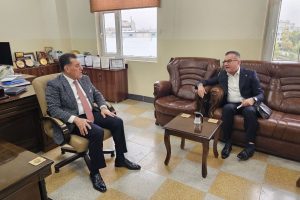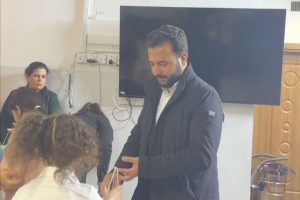Cihan University–Erbil Engages Scholars in Dialogue on the Kurdistan Issue and Middle Eastern Transformations After October 7th
 Under the patronage and in the presence of Professor Dr. Amjad Sabir Al-Delawi, President of Cihan University–Erbil, and with the attendance of university council members, faculty, students, and guests, the Department of International Relations, Diplomacy, and Law organized a panel discussion titled “The Kurdistan Issue in the Middle East After October 7th.” The session was presented by Dr. Adel Bakawan, President of the European Institute for Research on the Middle East and Africa.
Under the patronage and in the presence of Professor Dr. Amjad Sabir Al-Delawi, President of Cihan University–Erbil, and with the attendance of university council members, faculty, students, and guests, the Department of International Relations, Diplomacy, and Law organized a panel discussion titled “The Kurdistan Issue in the Middle East After October 7th.” The session was presented by Dr. Adel Bakawan, President of the European Institute for Research on the Middle East and Africa.
The panel, held on Tuesday, November 4, 2025, in the conference hall of Cihan University–Erbil, began with a speech of appreciation from Dr. Bakawan, who expressed his gratitude to the university for hosting such an important academic event. He commended Cihan University for creating a platform that encourages open dialogue on vital regional and international issues.
In the opening segment of his presentation, Dr. Bakawan analyzed the period of rapid and comprehensive changes occurring in the Middle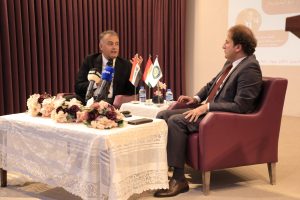 East and examined their repercussions on the Kurdish issue following the events of October 7th. He offered a detailed and critical analysis of the emerging regional dynamics, emphasizing how the October 7th events have reshaped political and geopolitical equations and may influence the future direction of the Kurdish issue.
East and examined their repercussions on the Kurdish issue following the events of October 7th. He offered a detailed and critical analysis of the emerging regional dynamics, emphasizing how the October 7th events have reshaped political and geopolitical equations and may influence the future direction of the Kurdish issue.
Continuing his discussion, Dr. Bakawan explored the role of the international community in the process of reshaping the Middle East based on the principles of democracy, equality, and human rights. He elaborated on how major powers and international organizations are striving to redraw the regional map and how these global efforts may affect the status and future of the Kurds, positioning the Kurdish question as an essential element of this regional restructuring.
 The speaker also dedicated part of his discussion to analyzing the influence of regional countries, particularly Iran and Turkey, on the Kurdish issue. He discussed the policies of these states toward the Kurds, shedding light on the political pressures, challenges, and constraints they impose, as well as the potential opportunities that could emerge for the Kurds amid ongoing regional transformations.
The speaker also dedicated part of his discussion to analyzing the influence of regional countries, particularly Iran and Turkey, on the Kurdish issue. He discussed the policies of these states toward the Kurds, shedding light on the political pressures, challenges, and constraints they impose, as well as the potential opportunities that could emerge for the Kurds amid ongoing regional transformations.
The panel, moderated by Dr. Omar Zubair, Head of the Department of International Relations and Diplomacy, further examined the evolving relationship between the Kurdistan Region and the Iraqi Federal Government after October 7th. Dr. Bakawan explained that relations between the two sides have always been of great political sensitivity and importance. He noted that the post–October 7th period has encouraged both parties to pursue deeper cooperation and coordination, especially in the areas of security and the resolution of long-standing disputes.
In this context, Dr. Bakawan emphasized that despite the existing challenges, there remains a genuine opportunity to build mutual trust and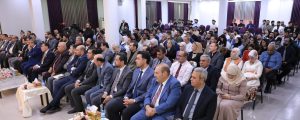 work collaboratively on key issues such as the budget, oil and gas law, and disputed territories. He stated that constructive dialogue and partnership can help protect the rights of both sides and ensure long-term political stability. His optimistic perspective suggested a potential shift from confrontation to cooperation and mutual understanding, particularly as regional and international changes continue to unfold.
work collaboratively on key issues such as the budget, oil and gas law, and disputed territories. He stated that constructive dialogue and partnership can help protect the rights of both sides and ensure long-term political stability. His optimistic perspective suggested a potential shift from confrontation to cooperation and mutual understanding, particularly as regional and international changes continue to unfold.
 At the end of the discussion, attendees were invited to share their comments and questions. Faculty members and students actively participated, raising thoughtful inquiries regarding the effects of political developments in Iran and Turkey on the future of the Kurds, the role of women in the Kurdish movement, the impact of new technologies on Kurdish liberation efforts, and strategies for addressing regional complexities. Dr. Bakawan responded to each question with analytical and scholarly insight, enriching the discussion and providing participants with a deeper understanding of the topic.
At the end of the discussion, attendees were invited to share their comments and questions. Faculty members and students actively participated, raising thoughtful inquiries regarding the effects of political developments in Iran and Turkey on the future of the Kurds, the role of women in the Kurdish movement, the impact of new technologies on Kurdish liberation efforts, and strategies for addressing regional complexities. Dr. Bakawan responded to each question with analytical and scholarly insight, enriching the discussion and providing participants with a deeper understanding of the topic.
